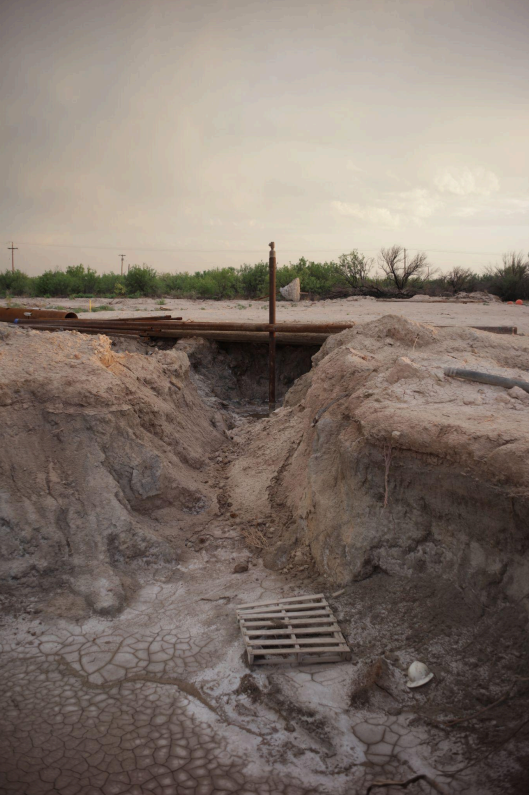By Virginia Palacios
January 23, 2024
On February 6, 2024 the Railroad Commission (RRC) will hear from Middle Pecos Groundwater Conservation District (MPGCD) on their formal complaint about the RRC’s jurisdiction to plug problem wells that were originally drilled as oil and gas wells, but were conveyed to landowners as “water wells.” Some of these wells are called “P-13 wells,” in reference to the Railroad Commission’s Form P-13 that is used for conveying the wells. This complaint, and how the RRC decides to handle it, is relevant to our groundwater quality and to landowners all over Texas who have agreed to take responsibility for such wells. Commission Shift is organizing a working group of interested stakeholders to discuss potential policy solutions to address problems that arise from these “P-13 wells.” Join the working group today!
We need to address bad state policy that can affect land and water for generations. The legislative interim is starting, which is a time during which lawmakers are available to meet with their constituents in the districts where they have local offices. Now is a good time for landowners and other affected groups to discuss issues with P-13 wells with their lawmakers.
The problem is that some P-13 wells have been leaking. The most notable of these has formed Boehmer Lake, a 60-acre saltwater lake in Pecos County where high levels of radionuclides and hydrogen sulfides have been recorded (see Straub Corporation, cited in an April 5, 2023 complaint filed by MPGCD. p. 18-19.). The RRC’s Form P-13 did not exist at the time the Boehmer Lake well — drilled as an oil and gas well — was conveyed to the landowner for use as a water well, but sometimes these wells are colloquially referred to as “P-13” wells. The well continues to flow at a rate of 200 gallons per minute.
Down the road, landowner Schuyler Wight found a leaking P-13 well on his property (pictured). The state told him that he had to take responsibility for plugging the well, so he attempted to do so. After spending $200,000, he was not able to successfully plug the well. Stories like this raise questions about the efficacy of the P-13 option. How much should we expect landowners to be able to spend to deal with problem P-13 wells? If the expense of plugging and cleaning up these wells is unreasonable, then should the program be allowed to continue?

Before being conveyed to a landowner, the RRC’s Form P-13 clearly states “the duty to properly plug the well ends only when the well has been properly plugged in accordance with Commission requirements up to the base of useable quality water (BUQW) stratum” (see screenshot of the form below). Hypothetically, this would mean that if the operator’s plug fails at some point, they are responsible for coming back to replug the well. And if the operator has gone bankrupt and is no longer in operation, then the well could be considered an orphaned well, and the Railroad Commission would be responsible for plugging the well.

Orphaned wells are defined in state law using three criteria.
“’Orphaned well’ means a well:
An oil or gas well conveyed to a landowner for use as a water well that has a failed plug to the BUQW and no active operator (who initially set the plug) meets all three of the components needed to be defined as an orphaned well. Defining wells as orphaned if they meet these criteria would allow the state to use funds it has available through the state-managed well plugging program or the federal Infrastructure Investment and Jobs Act (IIJA) to plug the orphaned wells.
Nonetheless, the Railroad Commission has thus far chosen not to interpret state law this way. Instead, the RRC says that landowners are responsible for plugging the wells, even if the operator’s plug fails. In fact, RRC attorneys have underscored that if the RRC plugs a P-13 well that is a menace to oil, gas, or water strata, they can recover the costs from landowners (see Railroad Commission of Texas Open Meeting on April 12, 2022 Timestamp: 1:00:30). One gray area is how much room there is for the commission to decide whether the former operator should be held responsible to any extent or whether the landowner is responsible for the former operator’s failure to properly plug the well to the BUQW.
Commission Shift will be paying attention to the outcome of MPGCD’s February 6th hearing, which will likely address some of these gray areas. It’s important for land and mineral owners who are considering or who have a P-13’d well on their property to get involved now while topics like this are being considered by the Railroad Commission and state lawmakers. If you are interested in being a part of our P-13 working group, please fill out our interest form and share with others you know who may be interested.
Learn More